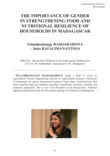The Importance of Gender in Strengthening Food and Nutritional Resilience of Households in Madagascar

There is enough food in the world to feed all human beings (BITTMAN, 2013), however, malnutrition and hunger are at an intolerably high level. Madagascar is one of the countries most affected by these scourges. Indeed, malnutrition remains a major public health and socio-economic problem in the country, affecting a large part of the population, especially infants and pregnant and lactating women (PNAN-III, 2017).
Madagascar is a country where the majority of the population lives mainly from agriculture (more than 70% of actives, but only approx. 26% of the GDP). Today, it is unanimously recognized that women play a central role in the agricultural sector In particular, they supply the bulk of the labour force: 60% of women of working age work in the agricultural sector. The woman also plays an important role in the food security of the communities (management of food stocks …).
Facing this, in the country, gender inequality exists and persists in many regions, especially in rural zones. Despite the significant role that women play in agricultural activities, and in particulary in the food security of the household, They are generally placed at disadvantage relative to men, mainly in regards of access to and control over resources and means of production (land , improved seed, fertilization, agricultural equipment, credit, information and technologies, etc.). In the household, they also have a low decision-making power.
Equity in gender relations and food and nutrition resilience within the household are closely linked. Promoting women's access to productive resources also seems to be a solution, but they must also contribute to social and economic change (BRIDGE, 2014). Women often play a greater role in ensuring food safety and quality, and are often responsible for processing and preparing food in their homes. Giving them importance, for example, nutrition education would help reduce micronutrient deficiencies within the household and improved her cooking capacities. An approach favoring men's positive commitment to children and women will also act as a multiplier effect of change at the individual and community level.
There is, however, another area of hope: increasing women's access to high levels of education, particularly in nutrition-related fields: for example, gender parity is almost attained in the training of agricultural engineers. This development can greatly help to promote gender equality.
| Alternative title | 家庭における食料と栄養のレジリアンス強化にはジェンダーが重要 - マダガスカル国の事例 |
|---|---|
| Date of issued | |
| Creator | Felamboahangy Henintsoa Rasoarahona |
| Subject | Gender equity households rural empowering woman Madagascar |
| Publisher | Japan International Research Center for Agricultural Sciences |
| Available Online | |
| NII resource type vocabulary | Conference Paper |
| Issue | 2017 |
| spage | 45 |
| epage | 52 |
